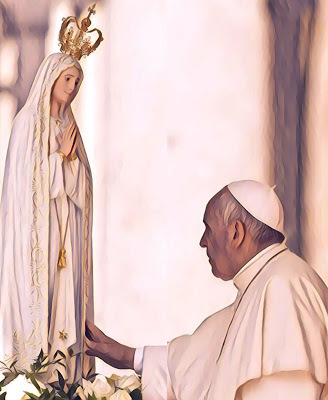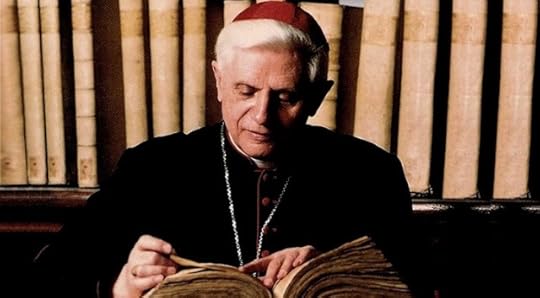John Janaro's Blog, page 210
May 25, 2017
Of Birds and Cats in Springtime
Adult blue jays this morning were harassing Reepicheep (you probably remember that's the name of our cat--don't blame me for that idea
Published on May 25, 2017 20:33
May 23, 2017
We Must Remember Every Day that God Loves Us
 I must remember every day that God loves me.
I must remember every day that God loves me. This is difficult, or at least it seems difficult, for a person with the limitations of physical and especially mental illness. There is a daily struggle to break out of self-absorption.
Living with life-restricting physical and mental illness, however, has also made me sensitive to how much this is a problem for everyone. We all have suffering, and most of us don't have a very good "handle" on it. And we are all bewildered in various ways, confused, "messed up" in our understanding of life.
Even the healthiest people have heads full of junk: junk accumulated from incomprehensible painful experiences, from the betrayal or simply the failure of other persons, from frustrated efforts and unfulfilled aspirations, from the smallness and frailty of being just one small human being in an enormous, clamorous, relentlessly demanding and seemingly unforgiving world, from the basic distortion of their relationship to reality that everyone has thanks to the heritage of original sin, and from their own sins and self-centeredness.
It's a miracle that any person can experience the fact that they are loved.
Yet it happens. We live in a world of miracles.
God loves me, yes. I would not exist in this moment if He did not love me. He is the Someone who is closer to me than I am to myself, and yet also the transcendent Mystery. I am made for Him. The deepest longings of my heart are drawn to Him.
I must remember this every day, with conviction and gratitude.
But there's more.
God has revealed Himself as Love. And the God-who-is-Love has given Himself to me and for me, for all of us: He has come to dwell among us. God is present for us in this moment, not only as our Creator, but also as Someone who has a name and a face and a history in this world.
Jesus Christ.
Through the life, death, and resurrection of Jesus, and through the decisive companionship He has thus established with the whole life of each one of us, we can encounter Him. If we follow Him, we will discover that He changes everything.
With all my incoherence and forgetfulness, I cannot deny that He has grabbed hold of my life. In His way and in His time--and even in the face of my own stubbornness and foolishness--He is changing everything.
He changes all my relationships. He changes my solitude. He changes my suffering. It's not necessarily a change in "the way I feel about these things." It's not that "now I feel good all the time" (I don't). He changes the realities themselves; He has entered into the stuff of life because He claims everything for Himself. He is present. He is at work in my life and in the life of every human person.
I must remember every day that God loves me. God loves us in Jesus, concretely. Jesus loves each one of us, and He has come to be with us.
Published on May 23, 2017 16:58
May 22, 2017
Shakespeare Outdoors!
On the left, Prospero and Ariel (played by GUESS WHO?); on the right, Ariel in her scary costume (made by her mother) in Shakespeare's The Tempest performed by the JOHN XXIII MONTESSORI CENTER'S Elementary Program under the direction of Mrs. Eileen Janaro. I took only a few pictures with my phone. Mostly I sat back and enjoyed the show. It was great fun, and I'm sure Jojo was not the only kid to get excited about Shakespeare.
Published on May 22, 2017 20:30
May 19, 2017
Face-Ball
I noticed online the Interesting Media Development that Facebook is now live streaming a game every week for free in cooperation with MLB.tv -- another sign that every internet platform is incorporating various aspects of live, interactive, audiovisual media. "New Media" (a term originally coined by Marshall McLuhan in reference to television) keeps getting newer all the time.
As for me, I watched the Nats on cable and put up with the commercials. For whatever reason, it didn't help their luck.

As for me, I watched the Nats on cable and put up with the commercials. For whatever reason, it didn't help their luck.

Published on May 19, 2017 20:00
May 16, 2017
Can There Be Joy in the Midst of Suffering?
 The Christian life is supposed to be characterized by "patience, endurance, and joy" (see e.g. Colossians 1:11). This may lead some Christians to think that if they experience suffering as something obscure, disorienting, or overwhelming, they are somehow not "being Christian enough."
The Christian life is supposed to be characterized by "patience, endurance, and joy" (see e.g. Colossians 1:11). This may lead some Christians to think that if they experience suffering as something obscure, disorienting, or overwhelming, they are somehow not "being Christian enough."Is it necessary for Christians to try to churn up cheerful, sunny feelings and the appearance of psychological tranquility when they are in the grip of physical or mental sufferings? Are they somehow "doing it wrong" if suffering weighs on them, i.e. if they experience suffering as suffering even after they ask for the Lord's help?
Certainly not. Emotions are indicators of attitudes and priorities that should not be ignored in any character assessment. But emotions themselves can often be the locus of suffering for a variety of reasons that are not related to people's decisions or actions or to anything else under their control. Moreover, there is a mysterious depth in the relationship between joy and suffering in anyone who adheres sincerely to the crucified and risen Jesus. Unfortunately, too often Christians feel pressured to conform to a rather superficial psycho-emotional profile even while enduring relentless and disorienting afflictions. And when they cannot hold up this artificial conformity they feel like they have failed to trust God enough, and are even tempted to discouragement.
Thus, it is important to clarify what we mean when we speak about Christian joy and patient endurance in the context of bearing sufferings. Of course, these things are real; they are capacities founded on the new life that we receive in the Holy Spirit when we are baptized into Christ. If the Holy Spirit dwells in us, we have the radical potential to endure our trials "joyfully" and patiently, to live them within the redeeming death and resurrection of Christ.
The grace of the Holy Spirit enables us to bear up "under" our difficulties with an awareness, a determination to keep going forward toward the goal that gives meaning to all of it. Concretely speaking, this is a "supernatural" goal, eternal life, the fullness of maturity in Christ, which means that patient endurance is the fruit of the working of supernatural grace. It cannot, therefore, be reduced to any merely natural psychological or emotional state.
This grace, this life in the Spirit, is a gift. Certainly it calls for the cooperation of our freedom, but it first of all elevates, empowers, and attracts our freedom. And if we allow grace to work, to engender the cooperation that is both a further gift of grace and the most profound realization of our own personal freedom in action, we are made more and more like God, living in His love.
It is the light of the Holy Spirit that enables us to recognize the destiny to which we are called. We grasp the reason why we must "never give up," why we must keep going forward. But this is a grasp in faith and love, which may not manifest itself clearly in our regular ways of understanding. Hence there can be "dark nights" and all sorts of strange and secret paths on which people are patiently bearing their burdens, especially when those burdens involve the cognitive and emotional incoherence that so often accompanies suffering on the natural human level.
It is important to emphasize this supernatural grace of the Holy Spirit by which we are enabled to bear willingly and faithfully any kind of crazy problem with patient endurance. Of course the grace that gives us a participation in God's own eternal life is working also (in its own time and its own ways) to heal and perfect our human nature. The whole personality of the Christian is being mysteriously transformed in Christ, and aspects of this mystery can sometimes "break through" on the mundane human level in striking and beautiful ways. Thus it is not surprising that we meet people in the world who possess Christian joy and patient endurance in suffering in a way that is obvious, that is visible and "tangible" to pretty much everyone.
How great and significant such Christian witness is in this world! It always strikes us with the freshness of a reminder of the fulfillment we seek, of the promise that is the root of our hope. It reminds us that in this present age, life in the Spirit (the life of grace) is "already" the beginning of eternal life, which is destined ultimately to heal and transform everything.
The presence of profound Christian joy in a suffering person's life, however, is usually not so "externally" obvious. It is the secret daily sustenance of so many humble people in their apparently unremarkable human struggles and pains. It cannot be simply reduced to any set of human emotions or personality traits. The joy engendered through a living relationship with Jesus and a firm hope in His mercy has strength and vitality beyond what we can perceive in others or even in ourselves.
But if we look with sufficient faith and attention, we may glimpse signs of this joy and loving endurance even in exceptionally hard and unusual places. We may find it mixed with the symptoms of the burdens it bears. We may be distracted from it by the rawness of the wounds that are borne, the physical or mental ugliness of the affliction, or the peculiar, confusing, and unconventional modes of love that have characterized the holy fools throughout history.
All God looks for is an open heart. He'll work with anything that doesn't oppose Him. If He could make children of Abraham from stones, He certainly can take badly broken human beings, failures, oddballs, beggars, crazies, and raise up exotic masterpieces of holiness.
Never look down on any human being. God loves each and every one of them with a persistence and an intensity beyond anything we can imagine.
The life of grace is a "process," and it takes a unique shape in each person's life, and in accordance with their concrete vocation, the burdens they bear, and the sufferings they must endure. It is a process of maturing, and it takes time. For most of us, it takes a long time to work through all the obscurities and ambivalence of our weak humanity.
But the Holy Spirit is at work in us, and is the source of our strength and our growth.
Let us therefore not be discouraged by our own weakness. Rather let us turn and return to our loving Father every day, place our trust in Jesus, and keep moving forward.
Published on May 16, 2017 20:45
May 12, 2017
100 Years Later: Fatima and the Prayer of the Gospel
 May 13, 2017!
May 13, 2017! Here we arrive at a bright moment in our Centennial, a moment that indeed is more present in significance and impact on the Church and the world than ever.
As we join Pope Francis in marking the 100th anniversary of the first visit of the Virgin Mary to the three shepherd children in the fields of the village of Fatima in Portugal, we begin a season of remembrance which is not simply recalling past events, but living the presence of Him who is the Son of Mary, who is Lord of history and who chose to intervene in the midst of the great evils of the world through the tenderness of His loving mother.
Mary came in a very particular way and entered the experience of little children (as the canonization of the young Jacinta and Francisco reminds us) during the period from May to October of 1917. She transformed their experience by presenting the full witness of the Gospel, letting them see both the tremendous mercy of God and the stubborn resistance of human beings bent on their own destruction.
She asked them (and us) to make sacrifices for sinners, to live the mystery of her Son's passion in a personal solidarity that would bring His saving presence to a desperate world.
And she asked them to pray. She asked them, and all of us, to enter more deeply into the whole of the Gospel, to be with Jesus in a more profound and intimate way by "praying the Gospel" in union with her own heart.
She asked us to pray the prayers given in the Gospel (from the words of the angel Gabriel, of Elizabeth "filled with the Holy Spirit," and of Jesus Himself) and to fill our minds and hearts with the Gospel, to learn to dwell with Jesus the way that she did. She asked us to join with her in her own great pilgrimage as she accompanied Him from the moment of the Incarnation to the fulfillment of the beginning of the New Creation in the glory that He has shared with her. We journey together with her, with hearts and hands and voices.
This is the Rosary.
Fatima is about Jesus. It is about growing closer to Jesus through His mother, the Theotokos. It is about growing closer to Jesus through the Immaculate Heart of Mary--her "heart" which is her utterly unique personality shaped by her singular experience of God's Love. She wants so much to draw all of us into the embrace of this Love, this tenderness that has transformed her into our mother.
She will teach us to become little children again.

Published on May 12, 2017 21:02
Joseph Ratzinger: The Word of Mary's Heart Changes History

Pope Benedict XVI, while he was still Cardinal Joseph Ratzinger, shared some profound reflections on the meaning of devotion to the Immaculate Heart of the Blessed Virgin Mary. These may help us as we prepare to commemorate the 100th anniversary of Mary's first visit to Fatima:
"In biblical language, the 'heart' indicates the center of human life, the point where reason, will, temperament and sensitivity converge, where the person finds his unity and his interior orientation. According to Matthew 5:8, the 'immaculate heart' is a heart which, with God's grace, has come to perfect interior unity and therefore 'sees God.'
"To be 'devoted' to the Immaculate Heart of Mary means therefore to embrace this attitude of heart, which makes the fiat—'your will be done'—the defining center of one's whole life. It might be objected that we should not place a human being between ourselves and Christ. But then we remember that Paul did not hesitate to say to his communities: 'imitate me' (1 Cor 4:16; Phil 3:17; 1 Th 1:6; 2 Th 3:7, 9). In the Apostle they could see concretely what it meant to follow Christ. But from whom might we better learn in every age than from the Mother of the Lord?"
In the message of Fatima, Mary says that "'my Immaculate Heart will triumph.' What does this mean? The Heart open to God, purified by contemplation of God, is stronger than guns and weapons of every kind. The fiat of Mary, the word of her heart, has changed the history of the world, because it brought the Savior into the world—because, thanks to her Yes, God could become man in our world and remains so for all time.
"The Evil One has power in this world, as we see and experience continually; he has power because our freedom continually lets itself be led away from God. But since God himself took a human heart and has thus steered human freedom towards what is good, the freedom to choose evil no longer has the last word. From that time forth, the word that prevails is this: 'In the world you will have tribulation, but take heart; I have overcome the world' (Jn 16:33). The message of Fatima invites us to trust in this promise."
Published on May 12, 2017 14:35
May 10, 2017
Her Witness of Love Endures
It is impossible to forget Christina Grimmie. There is more new music coming soon. Meanwhile, on this May the 10th, after 11 months, her witness of love endures and continues to touch hearts.
Published on May 10, 2017 17:18
May 9, 2017
How Are You, JJ?
 The cartoon version.So, how's it going, JJ?
The cartoon version.So, how's it going, JJ?I'm hanging in there. Slowing down (which is always hard for me to do). Reducing screen time because, really, the LED light bothers me. Soft light is better, natural light, of course, is best.
Reading old fashioned books. For whatever reason, I'm on a "monarchy" kick. I just finished a lengthy biography of Eleanor of Aquitaine, the amazing 12th century lady whose influence spread all across Europe.
Since Lucia is presently living in a house built from the stones of one of her ruined castles, I thought it would be fun to get better acquainted with Eleanor, Duchess of Aquitaine, sometime Queen of France, sometime Queen of England, mother of four kings.
What did I learn? Basically, that human beings really haven't changed all that much.
I'm also reading a large biography of the present Queen of England (got hooked by Netflix's excellent series, The Crown). And then, of course, reviewing my favorite dynasty: the ardently Catholic, often wacky, sometimes daft, sometimes heroic, occasionally holy (at least once), and always ingenious Habsburgs.
Sometimes I just don't have the energy to concentrate. But there's always music. I'm very grateful for music.
Perhaps I can rework some topic blog posts from the past and post them in the coming days.
Published on May 09, 2017 20:11
May 8, 2017
Our Name is Known to Him
Published on May 08, 2017 14:38




